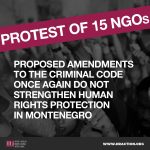- HRA kontakt
- Tel: +382 20 232 348
- hra@t-com.me
4/6/2015 – COMMENTARY OF THE PROPOSED AMENDMENTS TO THE CRIMINAL PROCEDURE CODE – FROM THE ASPECT OF HUMAN RIGHTS PROTECTION
2/6/2015 – ON THE DECISION OF THE STATE PROSECUTOR TO DROP THE INVESTIGATION IN THE CASE OF BREAKING GLASS ON THE VEHICLE OF JOURNALIST ZORICA BULATOVIĆ
03/06/20154/6/2015 – HRA AGAINST SPEECH INCITING TO VIOLENCE AGAINST THE MEDIA
04/06/20154/6/2015 – COMMENTARY OF THE PROPOSED AMENDMENTS TO THE CRIMINAL PROCEDURE CODE – FROM THE ASPECT OF HUMAN RIGHTS PROTECTION
The Draft has been promoted insofar by giving up on the proposal from the initial Draft that the state prosecutor, without a court judgment, may order banks to provide information on bank accounts and banking transactions.
The provision introducing the right to complain against the decision of the public prosecutor on dismissal of criminal charges will be useful as well.
However, the Draft Criminal Procedure Code still abounds with proposals that reduce the achieved level of human rights guarantees, including at least two unconstitutional solutions in relation to flat searching and determining secret recording of conversations by the state prosecutor, without a court order.
Restricting access to case files as a whole is contrary to the EU Directive 2012/13 on the access to information in criminal proceedings, and HRA proposed and that the defendant or defense counsel are provided insight into the criminal charges, instead of “presenting” its content, in order to respect the right to defense.
Bearing in mind that the European Committee for the Prevention of Torture noted that Montenegro did not effectively counter the practice of ill-treatment by the police, HRA sees no justification for extending the deadline for escorting the arrested persons from the police to the state prosecutor from 12 to 24 hours, for omitting the right of attorney and family members of the arrested person to demand from the public prosecutor to order medical examination, that the right to appeal to the decision on detention is limited to 8 hours (so far it was not limited by a deadline), as well to extend police detention from maximum of two to three days. Instead of such amendments, risky for protecting the integrity and personal liberty, HRA proposed that the state prosecutors are explicitly imposed duty to provide medical examination of the arrested persons whenever they learn of indications that abuse has occurred, and that the capacity of the public prosecutor’s office are not strengthened at the expense of human rights, but in another way.
With regard to the proposal that concluding plea agreements should now extend to all crimes, HRA warned that an analysis of the previous effect of this agreement and an appropriate debate should have been available prior to this proposal, before expanding its application. HRA reminded that the Supreme Court judge Svetlana Vujanović published in 2012 a serious critique of the then practice of application of this institute. HRA advocated that the control of this agreement of the State Prosecutor with the defendant is always entrusted to the court bench, not just one judge, in order to prevent errors and abuses, because otherwise these agreements could significantly contribute to an atmosphere of impunity that exists in Montenegro.
HRA believes that a panel of three judges, not just a single judge, should continue to control the indictment in order to provide a safer control, and standardization of practice. The problem of small courts where this three-member council is harder to provide may be solved by advent of judges from other courts for assistance, which is otherwise applied.
In relation to secret surveillance measures, HRA warned that the current solution that the state prosecutor approves a measure of conversation recording upon consent of one side is unconstitutional, and thus the court’s decision should be provided. HRA also opposed the extension of the control measures, particularly bearing in mind that it was proposed that some are determined by the state prosecutor himself.
HRA also advocated that there should be a right to appeal to an investigating judge against the decision of the state prosecutor not to reimburse the costs of the persons against whom it failed in the investigation, as well as to return the earlier explicitly prescribed right that the defendant and his/her defense counsel have the right to claim expenses in civil proceedings against the state, if the prosecutor does not approve them, or if the court does not decide on this.
HRA advocates that the Criminal Procedure Code is amended so as to precisely regulate the process of considering and rejecting criminal charges, and that limits for certain actions of the state prosecutor, following the example of Croatia, are prescribed in order to prevent the practice that the state prosecutor dismisses a received criminal complaint after two years, which is an inappropriately long term.
In relation to the decision to completely erase the basis for determining custody from Article 175, paragraph 1, item 4 “public disturbance”, instead of appropriately specifying it, HRA expresses its concern that this would only encourage the practice of courts to automatically determine custody whenever the sentence exceeds 10 years, which is contrary to European standards on the right to freedom.
HRA appraises the decision of the Parliamentary Committee on Political System, Judiciary and Administration to organize a debate on the Draft Law Amending the Criminal Procedure Code and invite the NGOs that participated in the public debate on the Draft Law. Dalibor Tomovic, attorney at law, participated at the discussion on behalf of HRA.
HRA team
* * *
HRA proposals for amendment to the Criminal Procedure Code are available here.







 English
English